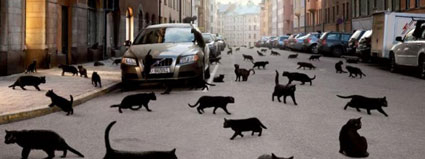The FINANCIAL — Leading Georgian insurance companies in auto insurance are claiming that they even insure the vehicles of residents of Gori, Zugdidi, lower Abkhazia and other regions of Georgia which became the victims of the August war in 2008 and our still considered most at risk of seeing conflict.
However, any damage caused while driving through the territories occupied by Russian military forces or separatists won’t be covered. Some companies refuse to cover damage caused by civil unrest or incidents involving representatives of local authorities as well.
Leading insurance companies in Georgia say that there were no major changes in the standard auto insurance contract terms after the August war with Russia in 2008. Standard policy that costs usually USD 30-50 per month, covers damage caused by vandalism, robbery, accidents and fire.
“If you’re travelling from Tbilisi to the western part of Georgia, you don’t have to worry provided you’re on territory under the jurisdiction of the Georgian Government. In this case any damage to your vehicle is deductable by the insurance company. But if something happens to your car while on territory occupied by Russian forces, the insurance company can’t cover any losses. However there are options for clients. When you pay an extra premium for insurance, the damages are compensated even during war conditions. Still these exceptions are very specific and are used mainly by international observatory missions working in the conflict regions,” says Lasha Nikoladze, Deputy Director General of Imedi L.
“Any legitimate owner of an auto who has the right of residence in Georgia for minimum a year has the right to insure their car with us. We insure cars in Gori and Zugdidi, but only in the territory controlled by the Georgian Government. However those clients living in potential conflict zones in the country are specifically warned of the details and omissions of an insurance policy when purchasing it,” Lasha Nikoladze continues.
Currently one third of the territory of Georgia is being controlled by Russian military forces, which in some blurry circumstances often cross borders. There have been cases of property damage near Gori and Zugdidi.
“If a car is hijacked on the territory not controlled by Georgian officials, the claimant won’t receive reimbursement. Despite high risks we still insure cars in the territory of Gori, Zugdidi and lower Abkhazia. But demand in the regions is very low. The highest activity in auto insurance is in Batumi and Tbilisi. Starting from 2006 the annual average growth rate was 40-60%, but this year we are seeing stagnation,” notes Giorgi Makharadze, Risk Management & Underwriting Department of GPI.
Giorgi Makharadze adds that war, civil unrest and earthquakes are included in the fundamental risks category and are not normally insured. The risks in this case are high because there’s a possibility that many cars will get damaged one at the same time. Despite this if the client wants to include earthquakes in the contract it’s theoretically possible, if they pay the extra premium. Nevertheless you can’t insure against war or civil unrest.
Starting from April 9 Tbilisi became a city of mock jail cells and rallies blocking the streets. Thousands of people took part in manifestations demanding the resignation of President Saakashvili. On 15 June Georgian police clashed with opposition activists. The demonstrators were beaten, along with a number of journalists. President Saakashvili seemed to criticize the police actions. But did that bring any comfort to the owners whose cars could have been scratched or damaged in the clash?
As insurance companies’ representatives say – No.
“The standard auto insurance contracts exclude compensation of any physical damage caused by civil unrest. Though if paying the extra premium a client can insure their car against this threat,” Deputy Director General of Imedi L told The FINANCIAL.
The same goes for the market leaders Aldagi-BCI and IRAO. The standard auto insurance package of Aldagi-BCI doesn’t cover losses encountered due to war and civil unrest. Aldagi-BCI covers damages caused by flood, but earthquakes and hail are excluded.
“Losses are not repaid in the case of civil unrest. That’s the general rule, both in Georgia and abroad. If a car was parked at the centre of a scene of civil unrest the loss won’t be repaid. The claimants won’t receive reimbursement no matter who damages the auto, protesters or the police. If the damage was intentionally caused by the police the case should be settled in court,” says one of the auto insurance experts.
“Since the August war we haven’t made any significant changes in the conditions of the standard auto insurance contract. It doesn’t matter who damages the car during the manifestations, even if it’s a police officer the insurance company doesn’t cover the loss,” Lasha Nikoladze says.
Like Imedi L, GPI hasn’t changed much of its auto insurance contract terms since the August war. Giorgi Makharadze says that there were one or two cars damaged during the war which were insured by GPI. And the losses weren’t covered by the company.
Global weather-related losses in recent years have been trending upward much faster than population, inflation, or insurance penetration, and faster than non-weather-related events. Some of the insurers exclude floods and natural calamities, so take it into account when you insure your car.
According to Imedi L there were no major car damage cases from the rallies which started in April in Tbilisi and became larger in May. Nevertheless the number of cars damaged by floods has relatively increased.
In line with most of the insurance companies interviewed there’s stagnation in auto insurance sales. They say that this is due to decline in the sales of new autos and the low rate of auto loans lending from banks.
“If we look at the sales dynamics of the last 5 months, we’ll see that the likelihood of the insurance sector ending the year with a loss is in fact very low. In 2009 we have had a decline in demand of individual clients who want to insure their cars. This is the result of the limitation on auto loans by banks. Today most of the banks don’t give out auto loans, while last year most of the auto insurance clients came with auto loans, “Giorgi Makharadze revealed in his interview with The FINANCIAL.
The wave of the financial crisis hit insurers in the same period as the banks were hit. Despite this the insurance sector was much luckier than banking. The demand for health insurance is rising as figures show. In some way it could be connected with the state insurance programmes which have been actively promoted in recent months.
Here are a couple of things you should pay attention to when buying your insurance policy.
Your policy may include:
• A rejection of future claims on an unreported accident.
• A refusal to renew your insurance policy.
• An increase in your insurance rates.
• Too tight deadlines of all accidents that must be reported to the police or the insurance company
• An obligation to remain at the scene of an auto accident, otherwise you may become subject to criminal prosecution.
Finally keep in mind that reporting an auto accident could be a breach of your insurance contract leading to many unexpected outcomes. So think twice about where and how you park your car.
Written By Levan Lomtadze





























Discussion about this post